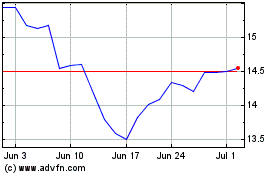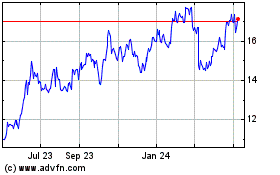RIO DE JANEIRO—For the past two months, Brazilian financial
markets have staged wild rallies over any sign that left-leaning
President Dilma Rousseff might be ousted from office, even as the
nation's economy spiraled further into the depths of its worst
crisis in generations.
Now, with a crucial impeachment vote looming on Sunday,
investors may soon get their wish for new leadership. If two-thirds
of lawmakers in Brazil's lower house vote to try Ms. Rousseff on
charges of doctoring the government's fiscal numbers, she will have
to step aside, at least temporarily.
But while markets are cheering, the prospects for a growth
rebound remain dim, even if Ms. Rousseff is succeeded by a more
business-friendly head of state.
"The economy suffers from a variety of original sins," said Joã
o Pedro Ribeiro, a Brazilian economist at Nomura in New York. He
says Brazil's "potential growth"—how fast gross domestic product is
capable of expanding in the long term—is now "very, very low" in
comparison with other developing countries.
The president's critics say she has mismanaged her nation's
once-flourishing economy and lacks the political skills to push
badly needed overhauls through Congress. Brazil's GDP shrank 3.8%
last year—the biggest contraction in a quarter-century, and a stark
turnaround from the 7.5% growth notched in 2010, the year Ms.
Rousseff was elected.
But the bleeding will likely continue regardless of who Brazil's
president is because the government has virtually exhausted its
firepower to fight the crisis. Years of economic stagnation,
combined with constitutionally mandated spending on things like
health care, education and pensions, have left Brazil's public
sector with a deficit of nearly 11% of GDP.
"We talk about entitlement spending in the U.S., but I mean,
that is what Brazil does—90% of the budget is entitlement spending.
There is no discretionary spending," said Edwin Gutierrez, who
manages $11 billion in emerging-market debt at Aberdeen Asset
Management.
The fixes Brazil needs would require politically unpopular
decisions, such as loosening labor laws and reducing automatic
minimum-wage increases, as public opinion is stacked against
elected officials of all stripes. Ms. Rousseff's likeliest
successor, Vice President Michel Temer, has signaled a pro-market
agenda but will likely have "a very narrow honeymoon" to implement
it, said Christopher Garman, head of country analysis at risk
consultancy Eurasia Group.
A Supreme Court judge recently ordered Brazil's Congress to
charge Mr. Temer with the same offenses it lodged against Ms.
Rousseff. While his chances of impeachment are considered slim
given his strong backing in Congress, sSeveral high-ranking PMDB
members have been implicated in a wide-reaching corruption
scandal.
A newly energized leftist opposition, meanwhile, is likely to
oppose any austerity measures he tries to impose.
"As a result, the binary manner by which markets are treating
this weekend's vote is probably somewhat misplaced," Mr. Garman
said in a research note on Tuesday.
On Monday, for instance, the Brazilian real soared 3% to a
nearly seven-month high against the dollar, even as a survey of
economists by the central bank showed GDP forecasts declining for
the 12th week in a row. The economy is now projected to contract
3.8% in 2016, repeating last year's dismal performance.
Many challenges ahead are enshrined in Brazil's 1988
constitution, which makes it practically impossible for the
government to lay off civil servants and allows workers to start
collecting social security at an average age of 54. The
constitution can be changed only with a two-thirds majority in
Congress.
Another big contributor to the deficit, a law that links minimum
wages and some pensions to inflation, would require a simple
majority in Congress to overturn. But it reflects a practice, known
as indexation, that permeates Brazil's economy, a legacy of the
country's historically high inflation rates.
Such problems, along with other obstacles to growth like
pervasive red tape and poor infrastructure, were masked from 2003
to 2011 by rising prices for Brazil's commodity exports. When
commodity prices began to falter during Ms. Rousseff's first term,
she intervened in the economy with populist policies that
temporarily sustained consumer spending but ultimately left Brazil
with a gaping budget deficit.
Ms. Rousseff attempted to right the fiscal ship after her 2014
re-election by naming a respected banker, Joaquim Levy, as finance
minister with the task of implementing an austerity program. News
of the appointment boosted Brazil's stocks and currency in a
phenomenon that local media called the "Levy effect."
But his most important measures fell flat amid heavy opposition
by interest groups in Congress, and he resigned in December.
Mr. Levy's struggles may bode poorly for Mr. Temer's hopes of
swiftly delivering his party's promise to overhaul the pension
system, cut wasteful government spending and stimulate private
investment.
"We thought when Joaquim Levy came on board…that Brazil was
moving in the right direction," said Michael Henderson, an analyst
at Maplecroft. "But there is a lot of inertia there; a lot of these
structural problems are hard to weed out. There are a lot of vested
interests."
The cautious view of Mr. Henderson and other economists
contrasts with the euphoria that has overtaken Brazil's financial
markets in recent weeks as impeachment proceedings against Ms.
Rousseff picked up speed in Congress.
Since mid-February, the benchmark Ibovespa equity index has
soared nearly 30%, and the real has appreciated by about 15%.
Stock-trading volume hit a near-record 8.27 billion reais a day in
March, research firm Economatica said.
Perhaps the best bellwether for investors' sentiment about the
political situation are shares of state oil company Petró leo
Brasileiro SA, which is buried under a mountain of debt and
embroiled in a multibillion-dollar corruption scandal that Ms.
Rousseff's critics blame on her party's interventionist
policies.
Though the company has made scant progress toward solvency and
reported its biggest quarterly loss ever on March 22, Petrobras'
local shares have roughly doubled in the past two months. Investors
are betting that Ms. Rousseff's eventual successor will open up
Brazil's oil sector and allow Petrobras to operate more like a
private company.
Neil Shearing, chief emerging-markets economist at Capital
Economics in New York, says it is possible that a market-friendly
regime could emerge when the dust settles.
"But the groundswell of public discontent against the entire
political class in Brazil may well prove to be a breeding ground
for a more populist movement to come to the fore," Mr. Shearing
said. "In the current environment, what comes after Dilma is highly
uncertain."
Write to Paul Kiernan at paul.kiernan@wsj.com
(END) Dow Jones Newswires
April 13, 2016 13:45 ET (17:45 GMT)
Copyright (c) 2016 Dow Jones & Company, Inc.
Petroleo Brasileiro ADR (NYSE:PBR)
Historical Stock Chart
From Mar 2024 to Apr 2024

Petroleo Brasileiro ADR (NYSE:PBR)
Historical Stock Chart
From Apr 2023 to Apr 2024
